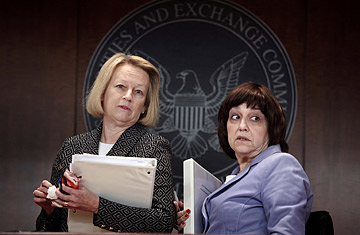
SEC chairwoman Mary Schapiro, left, and SEC commissioner Elisse Walter at SEC headquarters in Washington on April 8
Any list of people and institutions to blame for the financial crisis would include credit-rating agencies — the companies that assign letter grades to everything from General Electric's bonds to Malaysia's sovereign debt, indicating the chances that investors will lose money. The CEOs of the three largest agencies — Moody's, Standard and Poor's and Fitch — were assailed by Congress in October for the way their firms made record profits while raising few, if any, red flags about how massively risky mortgage-related securities had become.
In December, the Securities and Exchange Commission (SEC), which oversees the agencies, passed new rules to inject more transparency into the ratings process and to better mediate conflicts of interest. But those rules were severely watered down from what the SEC had proposed the summer before and subsequently dismissed by people who had been hoping for genuine reform. (See 25 people to blame for the financial crisis.)
Now the SEC, under a fresh chairwoman and a new President, is reopening the debate. On Wednesday it will host a roundtable discussion with the heads of both major and minor credit-rating agencies as well as investors and academic experts. "We're inviting a lot of the people who have had some very interesting ideas about what would be a better model," SEC chairwoman Mary Schapiro told Congress in March. "There have been some very thoughtful proposals put out there."
At the center of the conversation is how ratings agencies get paid. Since the 1970s, the largest ratings agencies have been paid by the companies that issue bonds or securities. This "issuer-pay" model has been roundly criticized for leading the agencies to cozy up to the firms creating financial products — especially the complex ones — by assigning ratings that are more favorable than justified in order to hold on to the business. At the beginning of 2008, there were just 12 top-rated companies in the world, but some 64,000 structured finance instruments, like mortgage-related CDOs, won that seal of approval.
Thousands have since been downgraded. "We need to consider alternatives to the issuer-pay model," SEC commissioner Elisse Walter said in a speech in March. One idea: level the playing field so that new competitors, like smaller agencies that charge investors instead of issuers, can better compete. Another option: a tax on investors, issuers or even the public at large in order to create a central pool of money with which to buy ratings to be made public. (See the best business deals of 2008.)
Who pays for ratings, though, isn't the entire issue. In a speech in early April, Goldman Sachs CEO Lloyd Blankfein put his finger on another deeply flawed part of the system: "Too many financial institutions and investors simply outsourced their risk management," he said. "Rather than undertake their own analysis, they relied on the rating agencies." In other words, the problem is not just the ratings agencies, but the way investors — from Wall Street firms to university endowments — have become mindlessly dependent on them. That is harder to fix.
But there is the beginning of an attempt to do so. Over the years, the judgment of ratings agencies has become enshrined in countless laws and private contracts; ratings are a key yardstick in how state and federal regulators determine the safety of banks, insurance companies, money-market mutual funds and other parts of the financial system. Over the summer, the SEC proposed some rules that would start the reform movement at home, undoing the agency's own dependence on the ratings agencies. (Read "A Brief History Of: Ratings Agencies.")
Those proposed rules didn't make the final December cut, but certain SEC commissioners want to revisit the issue. In a February speech, commissioner Kathleen Casey said it was imperative to address "the oligopoly in the rating industry" and overreliance on ratings in the SEC's rules. "These requirements — which accord privileged status only to ratings from certain firms — have served to elevate ... ratings to a status that does not reflect the actual purpose, much less the limitations, of credit ratings," she said.
Recalibrating the amount of power the ratings agencies wield in the world, though, is a Herculean task. Just seven years ago, in the wake of the Enron collapse, the Senate held hearings about the role of the ratings agencies — which considered the company's debt investment-grade until just days before it went bankrupt. The Senate investigation found that the ratings agencies hadn't asked particularly probing questions of Enron and had glossed over warning signs like accounting irregularities. In other words, the ratings agencies didn't objectively and accurately rate.
Not much ever changed.
